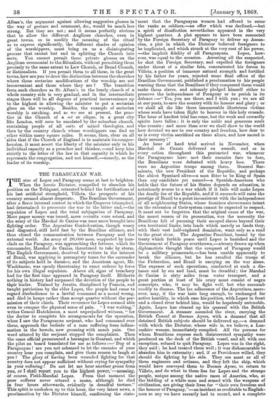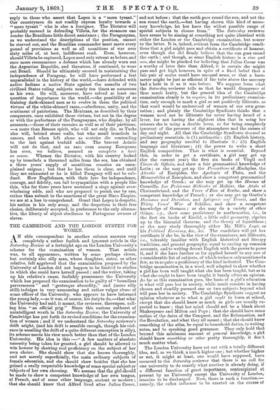THE PARAGUAYAN WAR. THE PARAGUAYAN WAR. T HE star of Lopez
and Paraguay seems at last to brighten. When the heroic Dictator, compelled to abandon his position on the Tebiquari, retreated behind the fortifications of his last artificial stronghold, Villeta, the prospects of his country seemed almost desperate. The Brazilian Government, after a fierce internal contest in which the Emperor triumphed, had determined to prosecute the war to the bitter end,—the expulsion of Lopez and the total subjugation of Paraguay. More paper money was issued, more recruits were seized, and the army of the Marshal de Caxias was once more brought into fighting order. The Argentine Confederation, though weary and disgusted, still held fast by the Brazilian alliance, and thus closed the communication between Paraguay and the external world. An army of 20,000 men, supported by ironclads on the Paraguay, was approaching the fortress, which its commander, Marshal de Caxias, threatened to take by storm. The English Government, deceived by writers in the interest of Brazil, was applying in peremptory tones for the surrender of its subjects held in durance, and the American agent, Mr. Washkune, was openly threatening to exact redress by force for his own illegal expulsion. Above all, signs of treachery had for the first time appeared in Paraguay itself. Hitherto nothing in history had surpassed the devotion of the people to *lir leader. Trained by Jesuits, disciplined by Francia, and taught patriotism by the elder Lopez, the people had come to regard disobedience to a lawful command as a moral wrong, and died in heaps rather than accept quarter without the permission of their chiefs. Their reverence for Lopez seemed able even to conquer the physical sense of pain. "I was waiting," writes Consul Hutchinson, a most unprejudiced witness, "for the doctor to complete his arrangements for the operation, when I saw the Paraguayan serjeant, who had command over them, approach the bedside of a man suffering from inflammation in the bowels, now groaning with much pain. One word uttered by the serjeant stopped the complaints. Then the same official pronounced a harangue in Guarani, and which the pilot on board translated for me as follows Dog of a Paraguayan ! are you not ashamed to let the enemies of your country hear you complain, and give them reason to laugh at you ? The glory of having been wounded fighting for that country does not appear sufficient without crying for sympathy in your suffering Do not let me hear another groan from you, or I shall report you to the highest power,'—meaning, of course, Field-Marshal Lopez. From that moment the poor sufferer never uttered a moan, although he died in four hours afterwards, evidently in dreadful torture." This spirit is unshaken up to this hour, the very latest news, a proclamation by the Dictator himself, confirming the state ment that the Paraguayan women had offered to enterthe ranks as soldiers,—an offer which was declined,—bat a spirit of disaffection nevertheless appeared in the very highest quarters. A plot appears to have been concocted. by the Foreign Secretary of Paraguay to deliver up Assun cion, a plot in which the Dictator believed foreigners to be implicated, and which struck at the very root of his power, —the implicit fidelity of all Paraguayans. Lopez, however, was equal to the occasion. Arresting all the suspected, he shot the Foreign Secretary, and expelled the foreigners under threat of a similar fate, concentrated his forces in. Villeta, a position of immense natural strength and fortified by his father for years, rejected some final offers of the Brazilian Government, published a proclamation to his people warning them that the Brazilians if they conquered them would make them slaves, and solemnly pledged himself either topreserve the independence of Paraguay or to perish in itsdefence :—" Yes, you are there, and I with you ; we are all at our posts, to save the country with its honour and glory ; or we shall all die like those innumerable illustrious victimswhose souls have taken flight to heaven in this holy crusade. The hour of hardest trial has come, but the weak and cowardly spirits have fallen ; it is only the noble and generous souls who remain ; and more than ever we shall show to the world how devoted we are to our country and freedom, how dear tous is every victim sacrificed on these altars, and how sacred is their memory !"
An hour of hard trial arrived in November, when Marshal de Caxais delivered an assault, and as in every action throughout this protracted war, whenever the Paraguayans have met their enemies face to face, the Brazilians were defeated with heavy loss. There were no Argentine troops among them. General Sarmiento, the new President of the Republic, and perhaps the ablest Spaniard alive—a man fitter to be King of Spainthan any candidate yet named—a Spanish-American who holds that the future of his States depends on education, is notoriously averse to a war which if it fails will make Lopez the deadly foe of the Republic, and if it succeeds will raise the prestige of Brazil to a point inconsistent with the independence of all neighbouring States, whose frontiers slaveowners intent on the extension of their system cannot be expected to respect.. It must not be forgotten that the original cause of the war, the secret -reason of its prosecution, was the necessity the Brazilians felt of pursuing their escaped slaves beyond their own territorial limits, into lands which merely as lands they,. with their vast half-explored dominion, want only as a road to the great river. The Argentine President, bound by the treaty which forbids peace until Lopez is banished and the Government of Paraguay overthrown,—atreaty drawn up when diplomatists thought that the conquest of Paraguay would be a military promenade,—has been unable apparently to break the alliance, but he has recalled the troops of the Federation, and Brazil is carrying on the war alone. The expense of such operations, conducted at such a distance and by sea and land, must be dreadful ; the Marshal de Caxias is sixty miles from water transport, and a great portion at least of his army must consist of negroconscripts, who, it may be, fight well, but who succumbreadily to disease. The lax adherence of the Argentines, moreover, may, if the war lasts long enough, be exchanged foractive hostility, in which case his position, with Lopez in front and a closed river behind him, would be hopelessly untenable. Again, Lopez has cleared up his quarrel with the British Government. A steamer ascended the river, carrying the British Consul at Buenos Ayres, with a demand that all detained British subjects should be delivered up,—a demand with which the Dictator, whose wife is, we believe, a Lancashire woman, immediately complied. All the persons forwhom Brazilians express such disinterested sympathy were produced on the deck of the 'British vessel, and all, with one exception, refused to quit Paraguay. _Lopez was in the right, they said ; he had treated-them -well ; it was dishonourable toabandon him in extremity ; and, if so Providence willed, they should die fighting by his side. They are most or all of them engineers and artizans, and they left the ship, which would have conveyed them to Buenos Ayres, to return toVilleta, and do what in them lies for .Lopez and the strange people, unique among the native races of America, who, at the bidding of a white man and armed with the weapons of civilization, are giving their lives for -"their own freedom and the honour of Paraguay,"—an incident as creditable to Englishmen as any we have recently had to record, and a complete reply to those who assert that Lopez is a "mere tyrant." Our countrymen do not readily express loyalty towards a "mere tyrant" who is also a foreigner. The Dictator will probably succeed in defending Villeta, for the steamers can render the Brazilians little direct assistance ; the Paraguayans, as we understand the descriptions of the position, cannot be starved out, and the Brazilian commander must move every pound of provisions as well as all munitions of war over sixty miles of, at best, indifferent road. Even, however, should Villeta be captured, Lopez need only retreat as before, and once more recommence a defence which has already worn out the Argentine Republic, and threatens, if continued, to wear _out Brazil. Should he ultimately succeed in maintaining the independence of Paraguay, he will have performed a feat unparalleled in the history of the world,—have defended with native Indians a native State against the assaults of two civilized States ruling subjects nearly ten times as numerous as his own. He will, moreover, have solved at least one question of importance to the world,—the possibility of so training dark-skinned men as to evolve in them the political virtues of the white-skinned races,—obedience, unity, and the sentiment of patriotism. The Mexicans, as described by their conquerors, once exhibited these virtues, but not in the degree or with the perfectness of the Paraguayans, who display, by all accounts,—those of their enemies as well as of their partizans, —a more than Roman spirit, who will not only die, as Turks also will, behind stone walls, but who assail ironclads in canoes, and when left alone as sentries die contending to the last against tenfold odds. The bravest Asiatic will not do that, and no race even among Europeans has ever, we believe, secured so complete a leve'e en masse. Whence the Dictator, with his country locked up by ironclads a thousand miles from the sea, has obtained a three years' supply of munitions remains an unexplained enigma ; but that he has them is clear, and until they are exhausted or he is killed Paraguay will not be subdued. How Englishmen, with their love for independence, courage, and fidelity, can fail to sympathize with a people like this, who for three years have sustained a siege against overwhelming odds, and who are prepared to perish one by one, rather than submit to the exactions of the great Slave Empire, we are at a loss to comprehend. Grant that Lopez is despotic, his nation is his only army, and the despotism is their free choice, deliberately accepted, in perference to the only alternative, the liberty of abject obedience to Portuguese owners of slaves.



































 Previous page
Previous page